RaLuna is an electronic music producer, singer, and DJ with over 30 years of experience in the scene, formerly known as Hideyo Blackmoon.
Originally from Japan and primarily based in Ibiza, She draws from a wealth of knowledge of meditation, yoga, healing, sound therapy, and composition, skillfully integrating these elements into transformative musical experiences.
She incorporates her ambient music compositions and extensive knowledge of healing arts into original sound therapy, witnessing the transformative power of music.
We talk with her about life, music, and everything in between.
Interview by Shantiago on 10/10/24.
Hi RaLuna, how are you? Thank you for spending some time talking with us.
Thank you so much for inviting me. I’m happy to share my story.
Are you currently in Ibiza? How was summer there? The island has always been a source of art and inspiration.
Yes, I am, and I’ve been enjoying kirtans, singing circles, and jam gatherings. These musical events are really blossoming here. I’ve also been going to alcohol-free parties where smoking is banned on the dance floor, which has been my dream for a long time. It was difficult to find this vibe on the island before, but after the pandemic, more people are interested in these kinds of parties.
Unfortunately, there’s been a crackdown from the authorities. They banned some of these events because of licensing issues and even fined organizer 300K. That’s one of the limitations of this island. So, I haven’t been to any “normal” parties like techno, house, trance, or even hippie-style parties since the pandemic. Please don’t ask me about the Ibiza party scene! lol
Firstly, who is RaLuna? What is the intention behind the transition from Hideyo Blackmoon?
We’ve all entered the “age of Aquarius,” which feels bright and light. I felt I needed to change myself to align with this new energy, and the name Blackmoon no longer resonated with me. I believe we’re ready to be healed collectively, and consciousness is awakening to a higher frequency. The name “RaLuna” came to me one morning last year, and I felt it was perfect—Ra represents the Egyptian sun god, and Luna means the moon. My old name, Hideyo Blackmoon, also had sun and moon symbolism: Hideyo means “sun comes out at night.”
Since then, I’ve been on a journey to transform into this new identity, following this unknown path with joy and listening to the whispers of my heart. RaLuna carries a similar intention as Blackmoon, believing music is the key to accessing our true selves. It helps break down the walls created by society, beliefs, and wounds, opening the gate to our hearts and connecting us with our divine self.
What’s your relationship with sound? Could you tell us about your music journey?
Are you sure, you’re ready? This is going to be long! lol.
I’ve been surrounded by music since childhood—my whole family was musical. I started keyboard lessons at age 3, although I wasn’t very disciplined about practicing. My brother introduced me to bands like Pink Floyd, Tangerine Dream, and King Crimson, and the music that had the biggest impact on me was Pink Floyd’s *Dark Side of the Moon*at age 10. The first vinyl I ever bought was by Isao Tomita, a synthesizer master from the ‘70s, at age 9. In high school, I was asked to be a vocalist, and soon after, I was in several bands, both in and out of school. I got into the nightclub scene in Tokyo in the mid-80s, which took over my focus more than school. I didn’t want to enter “normal” society, and eventually, drug include hard drugs became a part of my life.
I grew up with strict parents, and my father was violent toward my mother. I was sexually abused by a stranger at age 9, and after that, I was bullied at school. Looking back, I can see how my energy changed after this particular terrible event. My childhood and teenage years were tough, so I understand why my past self went down a dark path. At the time, I enjoyed my unhealthy lifestyle—it felt freeing. It was also considered cool to live that way at old time. I was already making mixtapes back in the day when cassette tapes were the thing—selecting music, organizing tracks, and creating what we would now call playlists. After clubbing, I always needed something relaxing to listen to. I gravitated towards ambient, drone, and experimental music, like Brian Eno, Steve Roach, and Art of Noise etc. Friends who hung out at my place would often ask me to share those tapes with them. That period also let me witness the rise of house music and the “four-on-the-floor” beat.
Tokyo’s club scene was booming then—Japan’s economy was high, and pop-up parties, after- hours events, and clubs and bars, fun things were everywhere. One night in the early ‘90s, I found myself in a 3000-capacity club in Tokyo, Dj from New York was playing, dancing to legendary tracks like Good Life by Inner City, Equinox by Code 718 and Sueno Latino etc. It was a monumental event where nightclubbers, public figures, and DJs gathered. On the dance floor, it felt like time and space dissolved, and we all became one unified lifeform. Years later, I understood that experience as the essence of “Oneness.” That was when my commitment to music was made. I didn’t know what I’d become, but I understood the power of music, and I knew I wanted to live with it as my life’s work. After that, I became completely sober. I shifted from nightlife to mornings, stopped all negtive substances, started going to the gym, and began building a healthy lifestyle.
My DJ friends started giving me turntables and DJ mixer they didn’t use anymore, and that’s how my setup came together. I began collecting vinyl, and Shibuya became my go-to. Back then, Shibuya was a mecca for DJs—the number of music shops and the sheer selection was incredible. Even DJs visiting from overseas were amazed by how you could find rare gems and gentle tracks there. Those are some great stories from the ’90s!
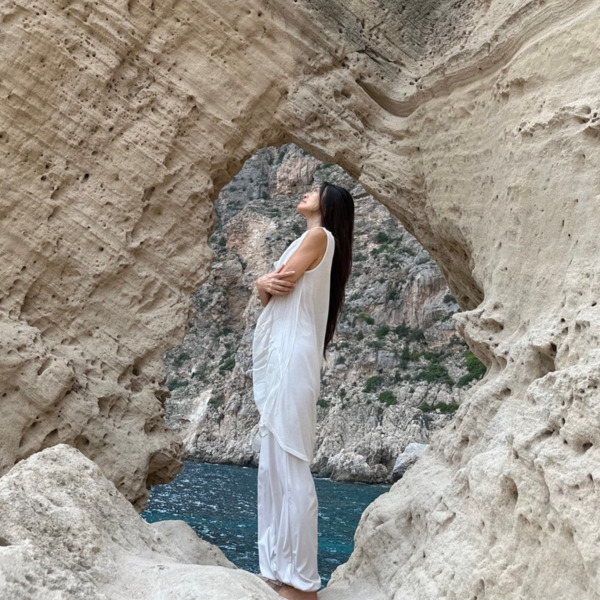
What is your connection with the Psytrance scene?
Oooops, Up until the previous part of my story, my musical journey was mostly tied to the Tokyo club and house music scene. But in 1997, I was invited to my first Psytrance party, and it completely blew my mind. It was this vibrant gathering of 15,000 people—a mix of friends, strangers, and partygoers coming together. Before I attended, I didn’t really understand the music, or why people would camp for a party, but after that experience, I got it. I discovered the chillout area, made a ton of new friends, and by the following year, I was being booked for festivals and parties one after another. The Psytrance culture’s deep connection to nature and its sustainable mindset also resonated with me. After that, I found myself attending Psytrance parties almost every weekend from spring to autumn in Japan.
In 1999, I went to Burning Man, which completely shifted my life and perspective. From then on, I began travelling the world in 2001, chasing festivals, and building connections with the global Psytrance tribe. A major turning point came during the Total Eclipse Festival in Zambia in 2001, where I spontaneously got the chance to play in the chillout area. It’s funny—things like that don’t happen so easily nowadays! That festival was a real gateway, deepening my connection to the Psy world. Even now, I still attend every Total Eclipse Festival possible, reuniting with tribes from Japan, the USA, Europe, and Australia, although the last one in Texas wasn’t quite the same vibe but was fun anyway. During my travels, I spent a lot of time with hippie friends who lived in tune with nature and embraced a New Age lifestyle. I was already somewhat aware of that way of living, but being around them, whether traveling or visiting them, inspired me even more. The magical journey continues, but I’ll stop here before the story gets too long!
Artist curator, club director, DJ, vocalist, and blossoming as a composer. Was it a natural
progression? Do you currently focus only on music production?
Yes, everything evolved naturally, step by step. I was initially asked to help organize parties and manage bookings for clubs, and eventually, I became a club director. At one point in ’97, a DJ I had booked didn’t show up, so I stepped in—and that’s how I started DJing. In ’99, I helped transform a failing bar into a popular ambient chillout salon. I was invited to be a vocalist there, which opened up even more opportunities to perform at different venues. The invitations kept coming, and along the way, I started learning about music production by watching other producers at work. After my performances, people would often ask if I had CDs of my music, and that’s when I realized there was demand, which pushed me deeper into music creation.
Now, my main focus is on music production also helping wellness retreat and daily life practices like meditation. Everything unfolded by trusting my gut, following my heart, and listening to the guidance I received along the way. I’m deeply grateful for all the synchronicities and the people who gave me these opportunities.
When creating music, do you follow any standard process? What kind of gear do you like to
use?
I’ve learned production from different producers over time, so I have my own unique process. Sometimes I start with a synth sound and layer from there, and other times I build dance music tracks traditionally, starting with the kick and bass. I began using Logic in the early days, but now I’m using Ableton Live.
How do you name your tracks?
The name usually comes when I see the final result, or I get a feeling of inspiration. If it’s for an album, I search for names that resonate and create a concept around them.
Do you find a strong correlation between music, spirituality, and healing?
Yes, very much. As I mentioned earlier, I was wounded and traumatized as a child. During my nightclub years,
dancing all night was my natural healing. When I later discovered dance therapy and trance dance—dancing blindfolded and moving freely—I realized that I had been healing myself through dancing for years. Dance and movement have healing power because they help release stuck energy and break down blockages. Our bodies store trauma, and dance music can create a hypnotic state or shift our brainwaves. When a DJ brings positive energy, they can help reprogram our subconscious toward the positive. But it’s important to carefully choose the DJ, just like a shaman.
Songs can touch our hearts and make us cry, and great singers are like shamans too. Lyrics matter because they carry energy. That’s why mantras, medicine songs, and heart songs are so powerful. Music is frequency, and positive frequencies affect us. The energy of the performer also gets absorbed into the music. I believe music is a direct key to our soul, and it’s important to follow our true self, not our ego. Even at parties, for me, it’s equal to spiritual work! haha!
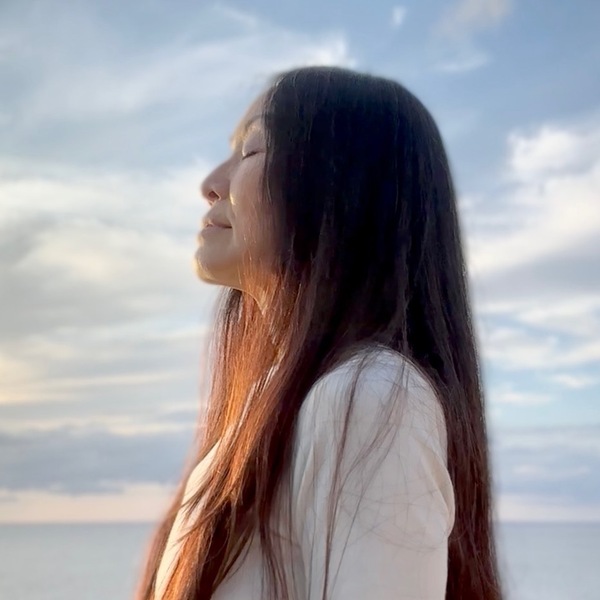
Do you also see a connection between yoga and music?
Traditionally, yoga is practiced in silence, but there’s Nada Yoga, mantras, and kirtans, which come from the Vedic tradition. So yes, there’s definitely a connection.
How is the ambient music scene in Ibiza these days? Are there many events or artists sharing
moments of calm?
There’s not much ambient music here, but there are lots of live music gatherings with traditional instruments, singing, drumming, and ethnic musical instruments. I didn’t even know so many traditional skilled musicians were here until last year.
What are your near-future plans?
No plan is my plan! I just surf the waves as they come and follow my gut when something feels right. And this is my new rule, once I make a decision, I will commit to it 100%. If I fail or things fall apart, I will just say, ‘So what?’ No regrets.
Who is RaLuna in her daily life? As a human being.
Living as much as possible “normal “ human life.. ;) When I wake up, I meditate for about an hour, sometimes more, sometimes less. Then I do exercises—yoga, qigong, or other types, depending on my mood. I might do voice
training or other practices. I journal, have breakfast around 10-12, and then start work on some project, whether it’s music or something on the computer. I eat lunch around 3-4, which is my biggest meal of the day. Afterwards, I either keep working, go out, or rest, depending on the day. Sometimes I work until midnight, but ideally, I stop around 7 or 8 pm. Then I watch YouTube or something else, read books, prepare for bed by 9 pm, meditate for about 30 minutes, and sleep.
Would you like to deliver a message to the psybient.org listeners, readers, and believers?
For sure. I imagine most of you are younger generations—young stars. I’m actually the one who wants to learn from you as you’re all smart, high-souled beings. But as an elder in this dimension, here’s what I’d say: Find your authenticity as soon as possible. Listen to yourself, not your ego mind. You are a divine soul, not just your mind. Heal yourself—that’s how we contribute to both ourselves and the world. It’s kind of our generation’s responsibility to take care of our own stuff, plus the burdens we’ve inherited from ancestors and others. Let’s heal ourselves and stop harming others. Let’s create a positive energy spiral and elevate the collective human consciousness. I believe in you. Thank you for coming to this world.
Before I go, I’d like to share that new therapeutic ambient music is on the way! It’s designed to support relaxation, sleep, healing, and perhaps even meditation practices. Thank you so much for this opportunity, and a big thank you to everyone who took the time to read this!
Thank you so much for sharing your words and insights. We keep our gratitude to your path and past releases, and we are looking forward to enjoying what will be offered with your new project. Peace and a big hug! See you soon!
Listen and follow RaLuna:
http://ralunamusic.com
https://soundcloud.com/ralunamusic
https://www.youtube.com/@ralunamusic

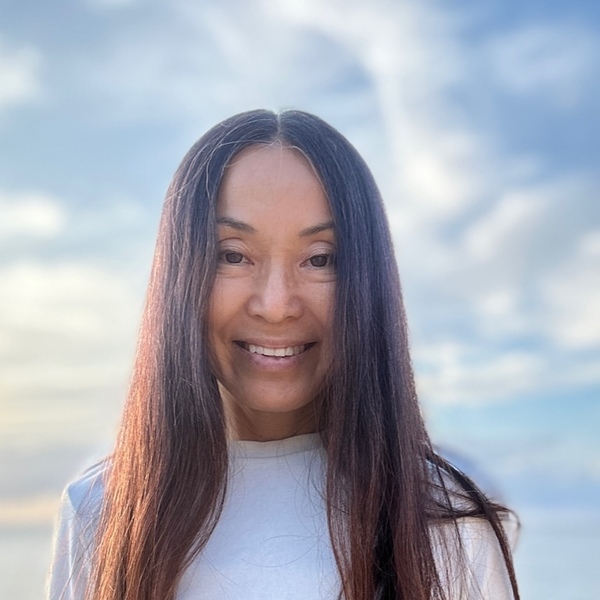
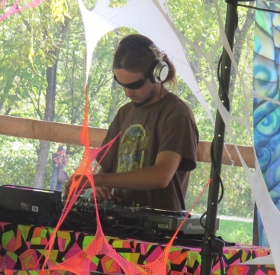
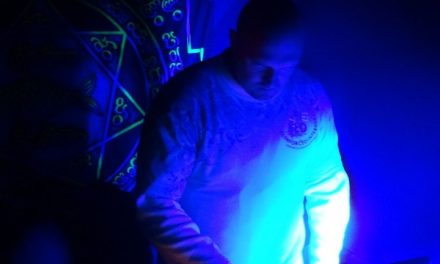
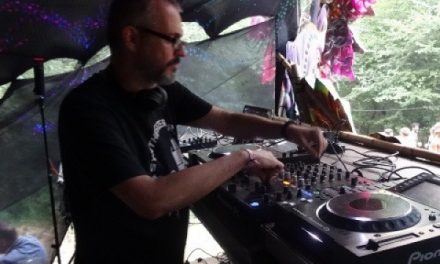
![Interview with Makyo [Dakini Records]](https://www.psybient.org/love/wp-content/uploads/Makyo-Interview.jpg)
